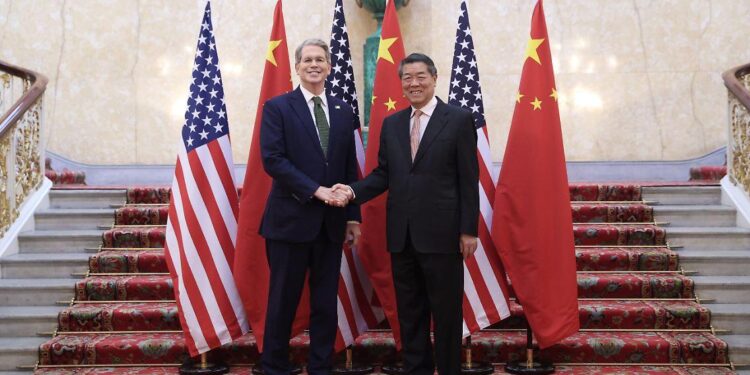Qingdao Multinationals Summit: A Catalyst for Global Investment and Innovation in China
The Qingdao Multinationals Summit recently convened a diverse group of leading multinational corporations in Qingdao, China, signaling robust international confidence in the country’s economic trajectory. This annual gathering unites top executives and policymakers worldwide to explore avenues for enhanced cooperation and investment within China’s swiftly transforming market. Emphasizing themes such as innovation, sustainability, and inclusive growth, this year’s summit spotlighted the critical influence of foreign capital on China’s economic development while addressing the complexities of an increasingly interconnected global economy. The event reinforced China’s status as a prime destination for international business collaboration.
Strengthening Global Partnerships: Highlights from the Qingdao Summit
This year’s summit served as a vital forum where multinational companies deepened their engagement with China by focusing on sustainable progress, cutting-edge technological advancements, and improved market accessibility. Key agreements forged during the event targeted sectors including renewable energy technologies, artificial intelligence (AI), and healthcare innovation—areas poised to deliver mutual benefits to both Chinese consumers and global enterprises.
Participating firms revealed ambitious initiatives such as:
- Establishing new research & development hubs across major urban centers to accelerate innovation pipelines.
- Forming joint ventures with domestic companies aimed at leveraging local expertise for enhanced market penetration.
- Pledging commitments toward environmental sustainability, aligning corporate strategies with China’s green development goals.
This strategic alignment reflects China’s broader policy framework designed to integrate its economy more deeply with global markets while nurturing internal growth dynamics. Despite ongoing worldwide economic uncertainties—including supply chain disruptions and geopolitical tensions—the summit reaffirmed that foreign investment inflows into China remain resilient.
Evolving Investment Patterns: Emerging Sectors Capturing Investor Interest
The discussions at Qingdao underscored growing investor enthusiasm around sectors driven by technological innovation and sustainability imperatives. Recent data from the Ministry of Commerce indicates that foreign direct investment (FDI) into high-tech industries surged by over 15% year-on-year in early 2024—a trend mirrored at the summit’s dialogues.
Main areas attracting heightened attention include:
- Renewable Energy: In line with China’s pledge to achieve carbon neutrality by 2060, investments are rapidly expanding in solar power innovations, wind energy projects, and emerging hydrogen fuel technologies.
- Artificial Intelligence: AI applications spanning manufacturing automation to smart city infrastructure continue gaining traction amid government incentives supporting digital transformation initiatives.
- Healthcare & Biotechnology: Accelerated by demographic shifts and increased health expenditure—projected to reach $3 trillion annually by 2025—this sector is drawing substantial cross-border capital flows focused on medical devices, pharmaceuticals, and telemedicine platforms.
- E-commerce & Fintech: With over one billion online shoppers nationwide as of mid-2024 according to Statista reports, digital commerce ecosystems remain fertile ground for innovative payment solutions and consumer engagement models tailored specifically for Chinese users.
| Sectors Experiencing Growth | Main Investment Drivers |
|---|---|
| Smart Manufacturing | Diversification through automation systems & Internet of Things (IoT) integration |
| E-learning Technologies | User-centric online education platforms catering regional demands |
| Sustainable Urban Development | Cities adopting smart grids & eco-friendly infrastructure projects |
| Agritech Innovations | Cultivation of alternative proteins alongside resource-efficient farming methods |
Navigating Market Complexities: Strategic Guidance for Multinational Corporations Entering China
MNCs aiming to expand their footprint within China’s multifaceted marketplace must adopt nuanced strategies tailored specifically toward local consumer behaviors—which vary widely across provinces—and regulatory frameworks that evolve rapidly. Comprehensive market research remains indispensable for understanding regional preferences ranging from product design nuances to marketing approaches aligned with cultural values.
A proven pathway involves cultivating strong alliances with established domestic partners who provide invaluable insights into distribution channels while facilitating smoother regulatory navigation. Recommended tactics include:
- Tapping into dominant digital ecosystems : Leveraging platforms like WeChat Mini Programs or Douyin (TikTok’s Chinese counterpart) enables direct consumer interaction enhancing brand loyalty.< / li >
- Customizing offerings : Adapting products or services based on localized tastes ensures relevance amidst diverse demographics.< / li >
- Prioritizing eco-conscious practices : Aligning operations with national environmental policies meets rising demand among environmentally aware consumers.< / li >
< / ul >Core Focus Areas< / th > Description< / th > < td >Regulatory Adherence< / td >< td >Maintain vigilance regarding legislative updates impacting industry-specific compliance requirements.< / td > < td >Local Collaborations< / td >< td >Engage trusted domestic entities fostering cultural fluency alongside operational efficiency.< / td > < td >Risk Mitigation Planning< / td >< td >Implement continuous risk assessments addressing financial exposure plus geopolitical uncertainties.< / td > The Road Ahead: Implications Beyond Qingdao Summit Outcomes
The Qingdao Multinationals Summit has once again demonstrated its significance as a nexus point where international investors converge around shared ambitions tied closely to China’s evolving economic landscape. The active participation from diverse industries underscores Beijing’s dedication toward opening markets further while nurturing symbiotic trade relationships globally amid shifting geopolitical realities.
The collaborative spirit fostered throughout this year’s sessions promises not only immediate business opportunities but also long-term partnerships capable of navigating future challenges collectively—from climate change adaptation efforts through green technology deployment upholding sustainable growth trajectories worldwide—to harnessing AI-driven efficiencies reshaping industrial paradigms globally. As these developments unfold beyond Qingdao’s borders they will undoubtedly influence patterns shaping international commerce well into coming decades—cementing China’s role as an indispensable hub within global value chains moving forward .














